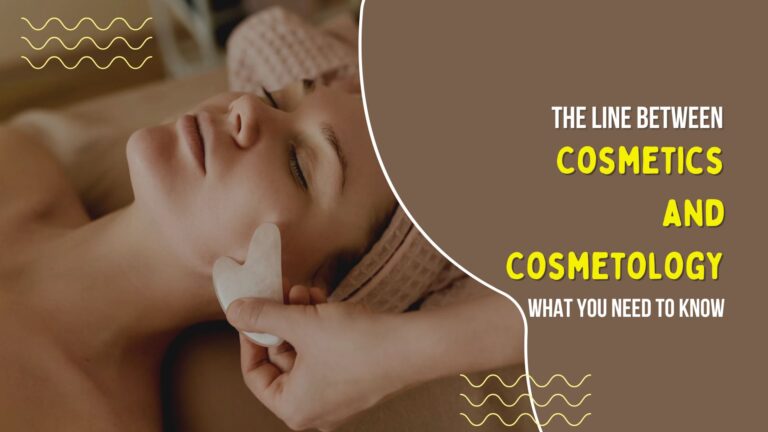In the realm of beauty, the terms “cosmetics” and “cosmetology” often arise, yet they represent distinct concepts within the industry. While both relate to enhancing appearance and promoting self-care, they serve different purposes and require varying levels of expertise. This guide aims to clarify the differences between cosmetics and cosmetology, highlighting what you need to know about each field.

1. Defining Cosmetics
What Are Cosmetics?
Cosmetics are products specifically formulated to enhance or alter the appearance of an individual. This broad category encompasses a wide range of items designed for use on the skin, hair, and nails. Key characteristics of cosmetics include:
- Aesthetic Focus: Cosmetics primarily aim to beautify, cover imperfections, or enhance features. They include makeup products like foundations, blushes, eyeliners, and lipsticks, as well as skincare products that improve the appearance of the skin.
- Safety Regulations: In many countries, cosmetics are regulated to ensure safety for consumers. Regulatory bodies, such as the FDA in the U.S., require that cosmetic products be safe for use but do not necessarily require pre-market approval.
Categories of Cosmetics
Cosmetics can be categorized into several types:
1.1 Makeup Products
- Face Makeup: Foundations, concealers, blushes, and bronzers that improve the complexion.
- Eye Makeup: Eyeshadows, eyeliners, and mascaras that enhance the eyes.
- Lip Products: Lipsticks, lip glosses, and lip liners that add color and definition to the lips.
1.2 Skincare Products
- Cleansers: Remove impurities from the skin.
- Moisturizers: Hydrate and protect the skin.
- Treatments: Target specific skin concerns, such as acne or aging.
1.3 Fragrances and Hair Products
- Fragrances: Perfumes and body sprays that enhance personal scent.
- Hair Products: Shampoos, conditioners, and styling products that care for and style hair.
2. Defining Cosmetology
What Is Cosmetology?
Cosmetology is the art and science of enhancing beauty through various techniques and services. It encompasses a broad range of disciplines, including makeup application, hairstyling, skin care, and nail care. Key aspects of cosmetology include:
- Professional Expertise: Cosmetologists are trained professionals who have completed formal education and training programs in beauty services. They learn various techniques and gain practical experience to perform services safely and effectively.
- Service-Oriented: Cosmetologists provide hands-on services to clients, helping them achieve their desired looks through personal consultation and application of techniques.
Areas of Specialization
Cosmetology includes several areas of specialization, each focusing on different aspects of beauty:
2.1 Hair Care
- Hair Cutting and Styling: Techniques for cutting, coloring, and styling hair.
- Chemical Treatments: Services like perming, relaxing, and hair coloring.
2.2 Skin Care
- Facials and Skin Treatments: Techniques for cleansing, exfoliating, and moisturizing the skin.
- Makeup Application: Professional application of makeup for various occasions.
2.3 Nail Care
- Manicures and Pedicures: Treatments for hands and feet, including nail shaping and polish application.
- Nail Art and Extensions: Creative techniques for enhancing nail appearance.

3. Key Differences Between Cosmetics and Cosmetology
Focus and Function
- Cosmetics: Primarily products used for enhancing appearance. They are typically applied by consumers themselves and are available for purchase in retail stores or online.
- Cosmetology: Involves professional services provided by trained individuals. It requires specialized skills and knowledge, focusing on delivering results through techniques and services.
Education and Training
- Cosmetics: No formal training is required to use cosmetics, though product knowledge can enhance application skills. Many consumers learn through personal experimentation, tutorials, or advice from beauty professionals.
- Cosmetology: Requires formal education and training, often leading to certification or licensing. Programs include practical training, theory, and hands-on experience to prepare individuals for a career in beauty services.
Regulatory Oversight
- Cosmetics: Regulated for safety but not always requiring extensive oversight before they reach the market. Consumers should be aware of product ingredients and potential allergens.
- Cosmetology: Regulated more strictly, with licensing requirements for practitioners. Cosmetologists must adhere to safety and sanitation standards to protect clients.
4. Consumer Perspective: Choosing Between Cosmetics and Cosmetology
When to Use Cosmetics
- At-Home Application: For everyday use or special occasions where you want to enhance your look.
- Personal Preference: If you enjoy experimenting with different products and techniques on your own.
When to Seek Cosmetology Services
- Professional Results: When you desire a specific look that requires expert application or techniques beyond your skills.
- Special Occasions: For events like weddings, proms, or photoshoots where professional makeup and hairstyling can make a significant difference.

5. The Future of Cosmetics and Cosmetology
Evolving Trends
The beauty industry is continually evolving, with trends shaping the landscape of both cosmetics and cosmetology:
- Clean Beauty: A growing movement emphasizing natural, non-toxic ingredients in both cosmetics and treatments.
- Inclusivity: Brands are expanding their product offerings to cater to diverse skin tones and hair types.
- Technology Integration: Virtual try-on tools and AI-driven recommendations are enhancing the consumer experience in both fields.
Conclusion
Understanding the distinctions between cosmetics and cosmetology is essential for anyone interested in the beauty industry, whether you’re a consumer or a professional. While cosmetics refer to products used to enhance appearance, cosmetology encompasses the professional techniques and services provided by trained experts. By recognizing these differences, you can make informed choices about your beauty regimen and seek the right services for your needs.
FAQs
Are cosmetics safe to use during pregnancy?
Many cosmetics are safe, but it's crucial to read ingredient labels and consult with a healthcare provider to avoid potential allergens or harmful substances.
Do I need to use both cosmetics and cosmetology services?
No, it depends on your preferences and needs. Many people use cosmetics at home while others prefer professional services for special occasions.
How can I find a qualified cosmetologist?
Look for licensed professionals with positive reviews and recommendations. Many salons and spas provide information about their staff's training and expertise.
What are some current trends in the beauty industry?
Current trends include clean beauty, inclusivity in product offerings, and the use of technology for personalized beauty experiences.


